Light Brown Pitbull With Blue Eyes Green Background
So you think you know what a Pitbull is? Well, I hate to be the bearer of bad news, but according to a variety of research, it is very likely that you don't! The University of Florida found that dog shelter workers, including Veterinarians, commonly mistake a variety of dogs as Pitbull type breeds, which not only is incorrect, but it can have a multitude of devastating consequences for the mislabeled pups. Many of these pups are just random mixed breed dogs, or some type of Pitbull mix.
 Advertisement
Advertisement
The term 'Pitbull' is not a dog as such, but a general label given to a few dog breeds with similar origins, appearance and temperaments. The four Pitbull type breeds are the American Pitbull Terrier, the American Staffordshire Terrier, the Staffordshire Bull Terrier and the American Bully. Despite their vicious reputation and their increased numbers in shelters, they are anything but vicious if they are raised properly.
This guide is going to set out the facts from the fiction regarding everything Pitbull. We bet that you will learn something new about Pitbull type dogs that you didn't know before. We've also compiled not only a comparison of the different types of Pitbull dogs, but also a full list of myths versus reality below.
Contents
- 1 Defining Pitbulls
- 2 Different Types of Pitbulls
- 2.1 American Pitbull Terrier
- 2.2 Red Nose American Pitbull Terrier
- 2.3 Blue Nose American Pitbull Terrier
- 2.4 American Staffordshire Terrier
- 2.5 Staffordshire Bull Terrier
- 2.6 American Bully
- 3 Breed Specific Legislation
- 4 Pitbull Myths vs. Pitbull Reality
- 5 Final Thoughts
Defining Pitbulls

Officially, a Pitbull is not actually a dog breed in itself. It's an umbrella term used for dogs who descend from Bulldogs and Terriers. There are four official breeds of the Pitbull type dog. However, often other similar looking breeds will also be chucked under the Pitbull label, which we will look into further in the next section. The American Pitbull Terrier is the main dog breed that is associated with the term Pitbull. Often when someone is talking about a Pitbull, they will more than likely be referring to an American Pitbull Terrier.
Terriers, who are known for their agility and feistiness, and Bulldogs, who are known for their brute strength, were bred together to create the perfect fighting dog. This breed was meant to be tenacious and powerful. Pitbull type dogs first originated in Great Britain. This is where bear and bull-baiting were popular but cruel, blood sports.
In 1835, when the Cruelty to Animals Act was enacted, this sport was thankfully stopped. But the spectators and participants quickly turned their attention to dogfighting events. They were cheaper to organize and easier to drive underground so to hide the events from law enforcement. Not only did these events involve gambling, but they enabled owners to showcase their dog's gameness and strength. The last dog standing, or fighting, won their owner the prize and reputation of breeding the best dogs around.
Reputation
This is where the Pitbull type dog's vicious reputation started. However, on an important note, all fighting dogs were obviously trained to be extremely vicious towards other dogs. But, as soon as a human entered the ring, they were trained not to attack. This is where their love of humans also stems from. Any dog that displayed human aggression were culled.
After the Civil War, British immigrants began to arrive in America, with their fighting dogs in tow. It was here that American dogfighters wanted to create an even bigger and more powerful fighting dog breed. This was where the American Pitbull Terrier, American Staffordshire Bull Terrier, and American Bully were born.
Different Types of Pitbulls

The following four dog breeds are the most widely accepted Pitbull type dogs. However, just to make it slightly more confusing, some breeds are only accepted by certain Kennel Clubs. And some are accepted by all Kennel Clubs. Many people argue that the American Pitbull Terrier and the American Staffordshire Terrier are the only two breeds that are true Pitbull type dogs. Others say that the American Pitbull Terrier and the American Staffordshire Terrier are in fact the same breed of dog.
So, dependending on who you ask, you may well get a different answer, but all the information in this article is what is the most common belief or what is commonly accepted by the professionals in the canine world.
Appearances
All Pitbull type dogs share their athletic and muscular look. Some may look more athletic than others. Some dogs are squatter and wider, some are taller and leaner. You can compare their heights and weights, according to their official breed standard, at the end of this section in the table. All Pitbull type dogs have a square-shaped head, a square fleshy nose, and big almond-shaped eyes.
All of their coats are short and smooth. They all require minimum bathing and brushing. Their tails are long and straight, and their ears tend to be rose-shaped, except of course when they have been cropped. Many owners still prefer this and adopt the look.
Coat Coloring
Pitbull type dogs come in pretty much any animal color you can think of, except for merle. While there are merle colored Pitbull type dogs out there, the merle color gene is not naturally found in these breeds. This means another breed with this color gene has been chucked into the mix at some point. Therefore a merle Pitbull type dog is not 100% of Pitbull origin. This color is not accepted by any breed club, so this is something to think about before paying the extra price tag for this color.
Temperaments
All four dogs tend to share the same temperament, adoring humans and craving their company. They also love to get involved in the family fun whether that be a game of football or a snooze on the sofa. They are very sweet and sensitive souls, and are particularly fond of children. This is how they earned their nickname, the nanny dog.
If not socialized adequately as a pup then they can display fear aggression against other dogs. But this is the same for a Chihuahua all the way up to a Great Dane. If they are socialized well they tend to be sociable with other dogs. Their eagerness to please their masters also means that they are a dream to train. If you are consistent in your training you will find an obedient Pittie sidekick on your hands. Let's take a closer look at each Pitbull type dog and their specs.
American Pitbull Terrier
- Height 17-21 Inches
- Weight 30-65 Pounds
American Staffordshire
- Height 17-19 Inches
- Weight 40-70 Pounds
Staffordshire Bull Terrier
- Height 14-16 Inches
- Weight 24-40 Pounds
American Bully
- Height 13-23 Inches
- Weight 25-60 Pounds
American Pitbull Terrier
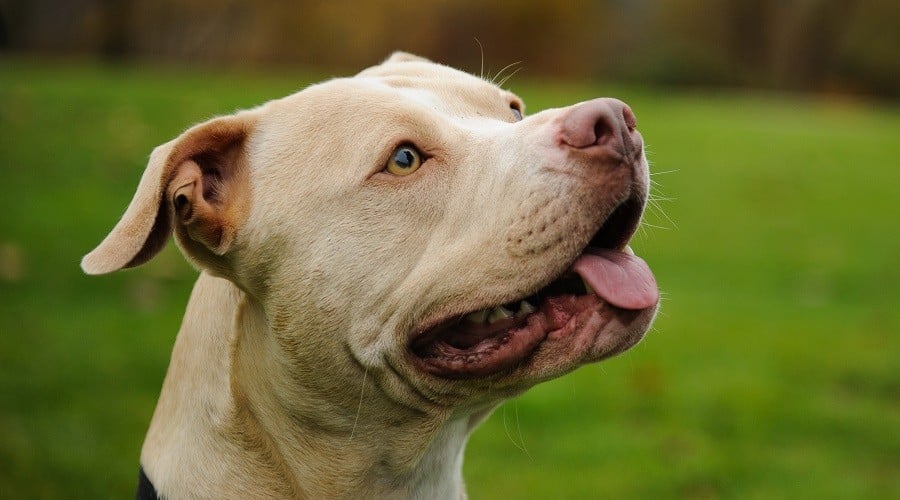
As previously mentioned, this is the most commonly spoken of Pitbull. It's the one that many think is the original, or the only, Pitbull type dog. This dog is not recognized as a breed by the American Kennel Club (AKC). He is, however, recognized by the United Kennel Club (UKC). It is stated that this breed has maintained his breed type for well over 150 years. Because of this, he is considered to be a purebred dog by the UKC.
Upon arriving in America, ranchers and farmers couldn't help but notice his athleticism, skill and obedience. These dogs quickly took employment on many farms and ranches as herders, and as hunters. Once his hard day's work was completed, he became the family companion for his master and his family. The American Pitbull Terrier is one of the tallest out of the four breeds. Being taller means that he is a lot more athletic in appearance. For further information on his appearance, the UKC breed standard of the American Pitbull Terrier can be found here.
APBT's come in a variety of different colors including brindle, black, white, brown or a mix of all of them. Along with the label comes additional health conditions and often higher price tags. The American Pitbull Terrier is also often compared to the American Bulldog or compared to the Staffordshire Terrier even though they are different breeds. They are also sometimes confused with the Dogo Argentino because they look similar.
Red Nose American Pitbull Terrier
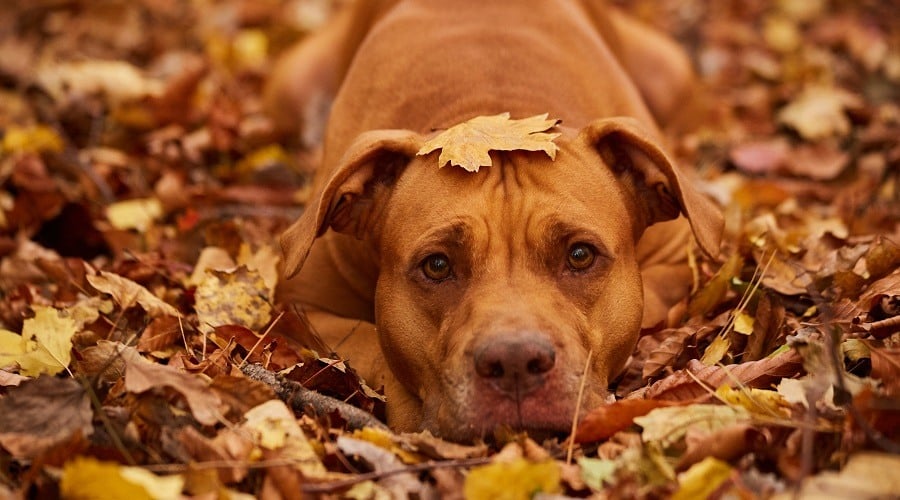
A red nose American Pitbull Terrier will have exactly that, a red nose. With the red nose comes copper or earthy brown coat colors, such as brown, red, fawn or chestnut. His lips, eyes and toenails are also red in color. While they are certainly rarer than the typical American Pitbull Terrier, they are exactly the same in every other way. They do have a few additional health concerns linked to the recessive gene, which is discussed further below.
Because he is rarer in color, many unethical breeders breed genetically close red noses in order to increase the chances of their puppies also being red noses, and thus generating more money. This breeding practice is frowned upon because it leads to genetic defects and poor health.
If you are seeking a red nose American Pitbull Terrier be sure to work with an ethical breeder who can prove family lineage, and the health of the pups. Just because they often sell for a few thousand dollars does not mean that they have been bred correctly or well looked after. Make sure to do your own due diligence!
Blue Nose American Pitbull Terrier
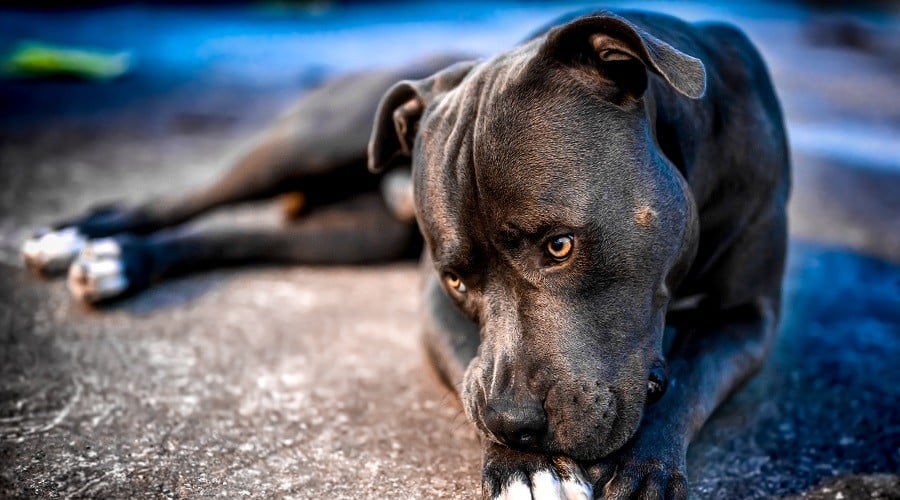
A blue nose American Pitbull Terrier is the same as the red nose American Pitbull Terrier, except he has a blue nose. His nose, lips, eyes, and toenails will be blue or grey in color, and he will be easily identifiable from a young age compared to the traditional black nose. Similar to other breeds, having a rarer coloring can come with a higher price tag, so be sure to work with a reputable breeder.
In addition to the inbreeding concerns given their smaller gene pool, the different color nose (including the red) is a result of low melanin levels. This is the pigment responsible for coloring in any living system, including us humans.
A deficiency in melanin, which is as a result of the recessive color gene, also creates additional health issues and diseases. It has been linked to skin allergies (which Pitbull type dogs are already prone to), heart diseases, eye conditions, and an increase in the chance of cancer and decreased immune system functionality. Which is all the more reason to work with a reputable breeder!
American Staffordshire Terrier

The American Staffordshire Terrier, commonly shortened to the name 'AmStaff', is recognized by the AKC and not the UKC. He is ranked as the 85th most popular dog breed out of 193 breeds. Research suggests that he is much more popular than this, with most owners not registering them for breeding or conformation purposes. He has long been one of America's favorite dogs, not only has he been the sidekick of 3 American Presidents, but he was also America's most decorated war dog.
The American Staffordshire has long been a family companion. His sweet nature has won the hearts of millions, not just in America but across the world. Despite his formidable exterior he is known to be one of the sweetest dogs around, who not only loves his family very much but also everybody that he comes into contact with. For this reason, he does not make the greatest of natural guard dogs. For further information on his appearance, his full breed standard can be found here.
Staffordshire Bull Terrier

The Staffordshire Bull Terrier is thought to be the most popular dog in Great Britain, yet being the 80th most popular breed in America his popularity has not quite caught on over here. He is recognized by all major Kennel Clubs, including the AKC and UKC. Staffies are described as clever, brave and tenacious. He's an affectionate dog who has a real love for life!
He is the smallest of Pitbull type dogs too, sometimes by 7 inches in height. The biggest Staffordshire Bull Terriers are around the same weight as the smaller dogs amongst the other dogs. Being smaller, the Staffordshire Bull Terrier is a great choice for those who love Pitbull type dogs but have less room for the stockier versions. Further detailed information on his breed standard can be found here.
American Bully
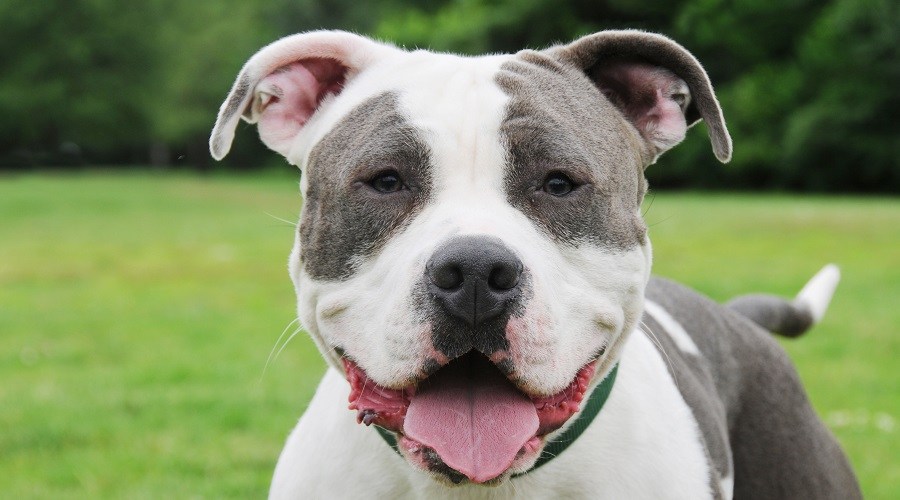
The American Bully is a descendant of the American Pitbull Terrier. Over time, he has become so distinct in appearance that he is now considered to be his own breed altogether. He is a relatively new breed that was developed in the 1980s, only recognized by the UKC in 2013. He is shorter than the American Pitbull Terrier and much wider than any of the breeds here in this article. These pups can be so wide that it often looks like his muscles have muscles! The American Bully is a larger pitbull-type dog, and has specific nutrition requirements.
He is recognized by the UKC, and not the AKC. The American Bully Kennel Club also recognizes him, and they recognize him in four distinct sizes: Pocket, Standard, Classic and XL (see sizes in the below table). The Classic American Bully is much narrower and less muscular than the other 3 sizes. Many people also believe that Micro and XXL American Bullies exist, and sell them as such, but these sizes are not officially recognized.
The most expensive American Bully, named White Rhino, was purchased for $250,000, and this exorbitant price tag is very rare. But American Bullies can be by far the most expensive dogs in America. The biggest American Bully on record is Hulk, who weighs a humongous 174 pounds! The American Bully is also often compared to the American Bulldog, English Bulldog, and (English) Bull Terrier.
Breed Specific Legislation
Pitbull type dogs are all subject to Breed Specific Legislation (BSL). This varies from country to country and state to state, all of which can, for example, enforce increased liability insurance all the way up to outright banning. Much research suggests that BSL is not effective and as such should be withdrawn.
Not only do owners have to deal with unfair and restrictive law, increases in insurance, and being excluded from home rentals, but they also have to deal with day-to-day prejudices from society thanks to a lack of education and the sensationalist media. This is despite controlled studies suggesting that Pitbull type dogs are not disproportionately dangerous.
While this subject needs an article in its own right, it is something that you need to take into consideration if you are thinking about welcoming a Pitbull type dog into your home. It's something that you must research thoroughly. For further information regarding local laws, this page lists the states that prohibit the regulation of certain dog breeds by local government.
Pitbull Myths vs. Pitbull Reality
Here we are going to look at the common myths versus what the reality is surrounding Pitbull type dogs. There are many different misconceptions when it comes to the breed, so we've compiled a list of the most commonly discussed myths versus the reality below. Let's dispel some of the bad, and take a look at some of the good.
Myth: All Pitbull type dogs are inherently dangerous.
Reality: No, not all Pitbull type dogs are dangerous. The American Temperament Test Society (ATTS) put dog breeds through a series of tests and challenges to test their temperament, and out of 35,686 dogs tested in the latest results (December 2017), the average pass rate was 83.7%.
The American Pitbull Terrier passed at 87.4%. Then, the American Staffordshire Terrier passed at 85.5% and the Staffordshire Bull Terrier passed at 90.9%. The American Bully temperament test results are not available (which does not mean they failed). However, the three Pitbull type dogs passed well above the average score, so this alone supports the case that Pitbull type dogs are not inherently dangerous.
Myth: Pitbull type dogs have 'lockjaw', which makes them more dangerous.
Reality: No, they do not have 'lockjaw'. There is no such thing as a lockjaw. All canine skulls are of the same design and have the same functions, and there is no locking function. Terriers are known for their tenacity and gameness, which is why when they get hold of prey, they keep hold of it. This is the very reason why Terriers were originally selected to be bred with Bulldogs.
Myth: You shouldn't rescue a Pitbull type dog because they were abused.
Reality: No, not all Pitbulls have been mistreated, and not all mistreated dogs are dangerous. There are simply so many Pitbulls, that they make up the highest proportion of dogs in rescue shelters. Consequently, they are the population that is euthanized the most too.
Equally, not all mistreated dogs are dangerous. Being a Pitbull type dog rescue mom, whose dog was badly beaten and given drugs during the first year of his life, he was later used as the 'tester dog' in rescue kennels to profile other dogs and their sociability, simply because he is so friendly. Pitbulls are the same as any other dog, there will always be a few dangerous pups. This entirely comes down to poor socialization as a puppy, but they are few and far between.
Myth: Do Pitbull type dogs really smile?
Reality: While science suggests that dogs can't smile, if you ask any Pitbull type mom or dad you will get a resounding yes from them! And if you don't believe them, then check out Lady Shortcake's Instagram page, who is one of the most smiley dogs, or velvet hippo as her mom calls her, to grace the planet!
Final Thoughts
While all the Pitbull type dogs have an undeniably grisly past, without it they most likely wouldn't exist. So, pitbull lovers across the world are somewhat thankful for it. Remember that they are all the most commonly found dog breeds in rescue shelters. If you are thinking about welcoming one of these pups into your home, then please consider adoption!
Despite their past, they are some of the sweetest canine souls around. They absolutely love humans, more than anything. All they need is a warm home and a master who will invest time in training and exercising them. So now you are equipped with the knowledge about what a Pitbull type dog is, and who they are, and if you are after a loyal canine who will be forever at your side, then look no further than these adorable sweet dogs!
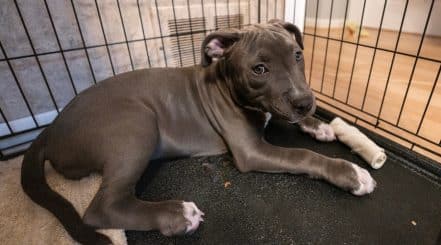
The information provided through this website should not be used to diagnose or treat a health problem or disease; it is not intended to offer any legal opinion or advice or a substitute for professional safety or care advice. Please consult your health care provider, attorney, insurance expert, or product manual for professional advice. Products and services reviewed are provided by third parties; we are not responsible in any way for them, nor do we guarantee their functionality, utility, safety, or reliability. Our content is for educational purposes only.
Leave a Comment
99 Comments
loveactereptur1964.blogspot.com
Source: https://www.loveyourdog.com/types-of-pitbulls/
0 Response to "Light Brown Pitbull With Blue Eyes Green Background"
Postar um comentário